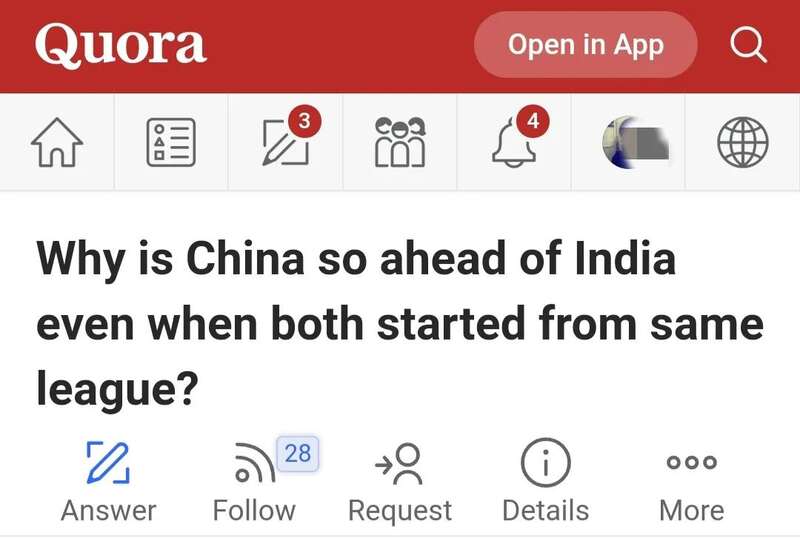
问题:中国和印度在建国初期水平差不多,为什么现在中国可以遥遥领先?

印度网友罗杰什•泰维的回答
All this talk about democracy dragging India down is nonsense. India's growth is not as fast as China's because we don't focus on key issues.
所有这些关于民主拖累印度的言论都是胡说八道。印度的增长没有中国快,是因为我们没有把重点放在关键的事情上。
Let's take a look at the corresponding three stages of these two countries:
让我们看看这两个国家相应的3个阶段:
Despair and pain: the Kuomintang ruled China (1912-1949) and the British king ruled India (1857-1947)
绝望与痛苦:国民党统治中国时期(1912-1949)和英国国王统治印度时期(1857-1947)
Socialism and Capitalism: the early days of the founding of new China (1949-76) and the Nehru family rule (1947-91)
社会主义与资本主义:新中国建立初期(1949-76)和尼赫鲁家族统治(1947-91)
Liberalization and Globalization: China in the period of reform and opening up (1976-) and liberalized India (1991-)
自由化与全球化:改革开放时期的中国(1976-)和自由化的印度(1991-)
Phase I:
第一阶段:
Although the rule of the Chinese Kuomintang in China was corrupt and cruel in the first half of the 20th century, China still had a place on the world stage at that time. After World War II, China became a permanent member of the United Nations Security Council, while India, although a founding member of the United Nations, did not obtain a corresponding seat. Without the veto power, India spent many years in a crisis ridden international environment and had to "buy" the veto power by forming an alliance with the Soviet Union and giving them a very favorable trade agreement.
虽然二十世纪上半叶中国国民党在中国的统治是腐败而残酷的,但当时的中国仍在世界舞台上占有一席之地。二战后中国成为联合国安理会常任理事国,而印度尽管是联合国创始成员国,却没有获得相应的席位。由于没有否决权,印度在危机重重的国际环境中度过了很多年,不得不通过与苏联结盟并给予他们非常有利的贸易协议来“购买”否决权。

重返联合国
Before 1949, despite the great damage caused by the civil war, China's literacy rate was still higher than that of India (30% and 12% respectively). However, in terms of economy, India is slightly ahead because it is in a relatively stable state.
1949年前,尽管内战造成了巨大破坏,中国的识字率仍高于印度(分别为30%和12%)。不过,在经济方面,由于印度处于相对稳定状态,印度略微领先。
Second stage:
第二阶段:
In the early days of the founding of the people's Republic of China, China completed many major events that directly affected future generations, laying the foundation for China as a big country.
中国在建国初期完成了许多直接影响后世的大事,奠定了中国作为一个大国的基础。
1. For example, barefoot doctors have provided necessary medical services in rural China, which has greatly improved the health status of people in remote areas. However, India is still at the stage of traditional medical degrees that only a few thousand students can obtain, which makes India's medical resources extremely scarce and has a great impact. In 1975, the life expectancy in China was 64 years old and that in India was 51 years old. This is a huge difference. Indians die earlier in their career, which directly affects the productive capacity of this country.
1. 比如赤脚医生为中国农村提供了必要的医疗服务,极大地改善了偏远地区人民的健康状况。而印度仍然停留在只有几千名学生可以获得的传统医学学位上的阶段,这让印度的医疗资源极度稀缺,带来的影响很大,1975年,中国的预期寿命是64岁,印度是51岁。这是一个巨大的差异,印度人在他们的职业生涯中死得更早,因此直接影响这个国家的生产能力。
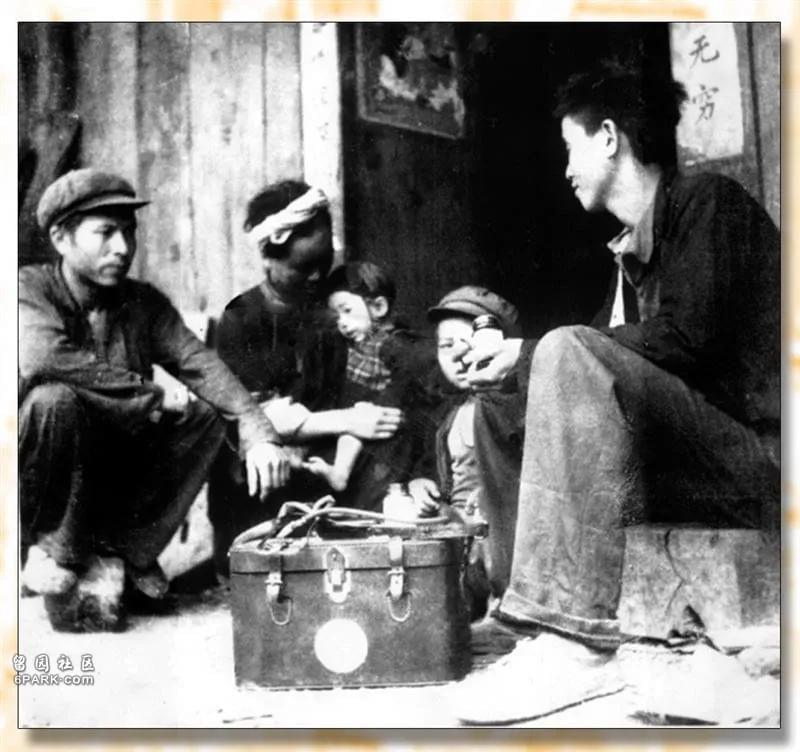
2. In the 1960s, China began to possess nuclear weapons and joined many international organizations - NSG, NPT, CTBT, etc. Nehru failed to realize the nuclear weaponization of India faster, and the nuclear program stumbled in the whole process. Due to the delay, we have to pay the price for the uncertainty and poor growth in the late 1990s.
2.20世纪60年代,中国开始拥有核武器,并加入了许多国际组织——NSG、NPT、CTBT等。而尼赫鲁未能更快地使印度实现核武器化,核计划在整个过程中步履蹒跚。由于延迟,我们不得不为20世纪90年代末的不确定性和糟糕的增长付出代价。
Most importantly, China has brought far more women into the labor force than during the Nehru administration. Nehru did not take any revolutionary action to break the patriarchy in India, while China broke the shackles of feudal society and let women play a key role.
最重要的是,中国把女性带到劳动大军中的人数远远超过尼赫鲁执政时期。尼赫鲁并没有采取任何革命性的行动来打破印度的父权制,而中国打破了封建社会的桎梏,让妇女发挥关键作用。
In 1976, China's GDP still lagged behind India, but it had all the elements to achieve large-scale growth - more female workers, healthier workers and safer energy.
1976年,中国的GDP仍落后于印度,但具备了实现大规模增长的所有要素——更多的女性工人、更健康的工人和更安全的能源。
Phase III:
第三阶段:
By 1976, China gradually opened up a new road. He opened the economy and allowed companies like Walmart to enter and open stores. And India, even 40 years later, is still afraid of companies like Wal Mart.
到1976年,中国逐渐开辟了一条新的道路。他开放了经济,让沃尔玛(Walmart)这样的公司进驻并开店。而印度呢,即使40年后,印度仍然害怕沃尔玛这样的企业。

Under the guidance of the new generation of leaders, China's industrialization and urban construction have developed rapidly. India gradually opened its economy in 1991, 13 years later, when China's GDP was already ahead. More importantly, India is at a disadvantage because of China's advantages in social infrastructure. For example, although the difference in literacy rate was only about 8% in 1950, by 1980, the difference had exceeded 20%. India's literacy rate fell to 44%, while China's literacy rate rose to 65%.
在新一代领导人的指引下,中国工业化和城市建设迅速发展。印度在1991年,晚了13年后才逐步开放经济,而那时中国的GDP已经领先。更重要的是,中国在社会基础设施方面的优势使印度处于不利地位。例如,虽然1950年识字率的差异仅为8%左右,但到1980年,这一差异已超过20%。印度的识字率下降到44%,而中国的识字率上升到65%。
India had the worst prime minister ever in the 1980s, Indira Gandhi, who was completely unfit for the job. It was during this period that China eliminated India and took the lead.
印度在20世纪80年代有着有史以来最糟糕的首相,英迪拉·甘地,她完全不适合这项职务。正是在这个时期,中国对印度进行了淘汰,取得了领先。
In short, China's growth is due to:
简而言之,中国的增长是因为:
1. They pay attention to the basic education of the people, such as literacy, public health and women's participation. From Nehru to the current Indian leaders have never paid such attention.
1、他们关注人民的基础教育,如识字、大众健康和妇女参与。从尼赫鲁到现在的印度领导人都没有过这样的关注点。

2. Before 1949, they had independence and global status, which helped them become members of the United Nations Security Council and other international organizations.
2、1949年以前,他们就具有独立性和全球地位,这有助于他们成为联合国安理会等国际组织成员。
3. It is to accelerate the pace of economic opening up and be more decisive.
3、是加快经济开放步伐,更加果断。
Whether India can have these advantages or not has nothing to do with whether India is a democratic country. We just lost our way in the middle and have been confused so far.
这些优势印度能否具有都与印度是否作为一个民主国家无关,我们只是在中间迷失了方向,而且迷茫至今。

德国专家格特•布什的回答
Until the 1980s, China and India were almost in the same position, but since then, China began to surpass India.
直到20世纪80年代,中国和印度几乎处于同一位置,但从那以后,中国开始超越印度。
The first reason is political stability. China's domestic political situation is stable, and its policies are flexible and consistent.
第一个原因是政治稳定。中国国内政局稳定,政策灵活具有一贯性。
The second reason is infrastructure. China has invested heavily in its infrastructure, which in turn has attracted foreign direct investment. Nowadays, almost every company has a manufacturing center in China.
第二个原因是基础设施。中国对其基础设施进行了大量投资,这反过来又吸引了外国直接投资。如今,几乎每家公司在中国都有一个制造中心。
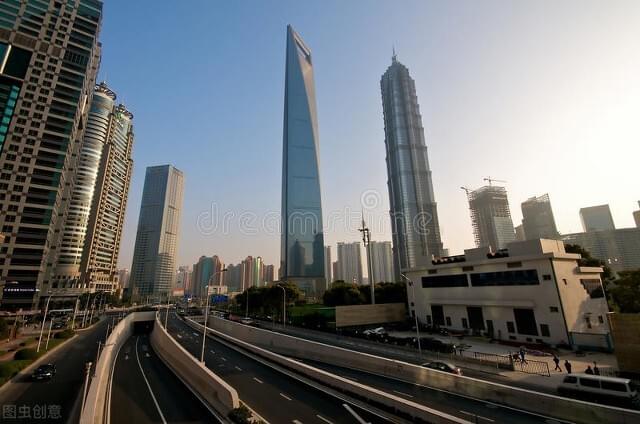

The third reason is "made in China". China started their project in the 1980s, while India started "made in India" in 2014. It took China more than 40 years to make their project successful. In India, some political parties began to cry after six years, saying that "made in India" was a failure.
第三个原因是“中国制造”。中国在20世纪80年代开始了他们的项目,而印度在2014年开始了“印度制造”。中国花了40多年时间才使他们的项目成功。而在印度,一些政党在6年后开始哭泣,称“印度制造”是一场失败。
The fourth reason is mentality. China has long accepted the fact that China has a large population, and not everyone can find government jobs. Therefore, instead of encouraging children to prepare for IAS or UPSC, they have improved the skills of the younger generation to work in industry and manufacturing.
第四个原因是心态。中国很早以前就接受了这样一个事实:中国人口众多,并非每个人都能找到政府工作。因此,他们并没有鼓励孩子们为IAS或UPSC做准备,而是提高了年轻一代的技能,让他们在工业和制造业工作。
If India wants to surpass China, it needs to focus on its own investment and industrial sectors.
如果印度想超越中国,就需要专注于本国的投资和工业部门。
However, the business environment in India is too poor. Not only Chinese enterprises will be severely skinned by taxes in India, but even western countries such as Europe, America, Japan and South Korea will be severely fined by the Indian government and then exit in embarrassment.
可印度的营商环境实在太差,不光是中国的企业在印度会被税务狠狠扒皮,即使是欧美、日韩等西方国家在印度投资,也会被印度政府狠狠割肉,然后狼狈退出。
The United States had hoped that India would replace China as the world's major economy and encouraged American enterprises to actively invest in India. The Indian government also offered generous subsidies to try to attract Indian enterprises. However, these enterprises that came to India either shelved long-term investment plans or simply launched the Indian market, turning India into a veritable investment "black hole".
美国曾寄希望于印度取代中国成为世界主要经济体,并鼓励美国企业踊跃投资印度,印度政府也提出了丰厚的补贴试图吸引印度企业,不过这些来到印度的企业要么搁置了长期的投资计划,要么干脆推出印度市场,把印度变成了一个名副其实的投资“黑洞”。
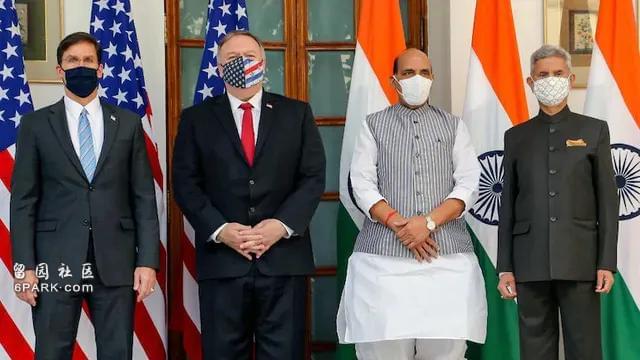
Although the United States, Europe, Canada and Japan all regard India as a major partner in the future, the enterprises of these countries either withdraw from India or reduce the scale of investment in India.
尽管美国、欧洲、加拿大和日本都将印度视为未来主要的合作伙伴,但这些国家的企业要么撤出印度,要么缩减在印度的投资规模。
The 2021 investment environment statement issued by the US State Department directly describes India as "a challenging place to do business". Swiss building materials company Holcim, Royal Bank of Scotland, well-known motorcycle company Harley Davidson and Citibank of the United States have announced plans to lay off staff or leave India. German retailer Metro was forced to choose to sell all its 20-year-old Indian business. Ford Motor Company and Tesla company also announced that they have shelved the production plan of electric vehicles in India.
美国国务院发表的《2021年投资环境声明》,更是直接将印度描述为“一个有挑战性的经商之地”。瑞士建材公司豪瑞、苏格兰皇家银行、知名摩托车企业哈雷戴维森和美国花旗银行,都已经宣布了裁员或离开印度的计划。德国零售商麦德龙被迫选择将经营20年之久的印度业务全部售出。福特汽车公司和特斯拉公司也宣布,他们已经搁置了在印度的电动汽车生产计划。
Even British telecommunications company Vodafone, energy company Cairn and Hong Kong Hutchison Whampoa have become victims of investment in India. They are all required to pay high taxes and fines by the Indian authorities because of mergers and acquisitions.
就连英国电信公司沃达丰,能源公司凯恩以及香港和记黄埔也成了投资印度的受害者,他们都因为并购等问题,被印度当局要求支付高昂的税收和罚款。
Foreign investors in India will not be welcomed by government departments and Indian civilians, nor will they receive many preferential treatments as in China. The Indian government can nationalize the money of foreign investors with any excuse.
外国投资者在印度,不会受到政府部门和印度平民的欢迎,更不会像在中国那样收到诸多优待,外国投资者的钱,印度政府随便找个借口就可以收归国有。
Under the influence of the past colonial history and today's national pride, India is very alert to foreign capital. They believe that India's poverty is caused by the exploitation of colonists in the past, and foreign investors should "repay their debts". In the past three years, the proportion of foreign direct investment (FDI) flowing into India has decreased from 3.4% to 2.8%, while China's share has increased from 14.5% to 20.3%.
印度在过去殖民历史和如今的民族自豪感的影响下,对外来资本十分警惕,他们认为印度的贫穷是过去殖民者的剥削造成的,外国投资者应该“还债”,近3年,全球流入印度的外国直接投资(FDI)比例从3.4%下降到2.8%,与此同时,中国的份额从14.5%上升到了20.3%。
India was founded two years earlier than China. At the beginning of its founding, it had an unparalleled economic foundation and strength in the third world. Coupled with the strong assistance and support of the Soviet Union in the first three decades, it had not been able to establish a full range of industrialization like China. The population of India and China is equivalent, and the development is only equivalent to one fifth of China's total economy.
印度比中国早两年建国,建国之初拥有第三世界里无与伦比的经济基础和实力,加上前三十年受到苏联的大力援助和扶持,尚未能够建立起同中国这样门类齐全的工业化,印度和中国人口相当,发展至今仅相当于中国经济总量的五分之一。

新加坡网友大卫•贝利的回答
70 years ago, India and China were very close in terms of GDP and population. What made the two countries go further and further apart?
70年前,印度和中国在GDP和人口方面非常接近,是什么让两国渐行渐远呢?
• the wrong way. India opened its economy in 1991. Even after becoming a western style democracy, India chose socialism economically, which made India's regime very distorted.
•错误的道路,印度在1991年开放了经济,即使是在成为一个西方式的民主国家之后,印度在经济上选择了社会主义,这让印度的政体非常扭曲。
• in 1979, China and the United States re established diplomatic relations. Due to China's cheap labor and low rent costs, the United States brought a lot of foreign investment, while India's foreign investment was quite excluded.
•1979年,中国与美国重新建立了外交关系,由于中国廉价的劳动力和低廉的租金成本,美国带来了大量的外国投资,而印度对外资则相当排斥。
• since the 1980s, China has achieved double-digit growth in the next 15 years, when it took over the position of India.
•从20世纪80年代开始,中国在接下来的15年里实现了两位数的增长,这是它接管印度位置的时候。
• population: although India and China have the same population, China has wisely used its demographic dividend. The Chinese government has promoted the skills development of young people and encouraged their population to join the manufacturing industry.
•人口:虽然印度和中国人口相同,但中国明智地利用了其人口红利,中国政府促进了青年人的技能发展,并鼓励其人口加入制造业。
• as a large number of people began to choose manufacturing, in 1990 and early 2000, China gradually became a world producer by simply introducing top brands, and developed countries took advantage of this advantage to establish factories in China.
•随着大量人开始选择制造业,在1990年和2000年初,中国通过简单引进顶级品牌慢慢成为世界生产国,发达国家利用这一优势在中国建立了工厂。
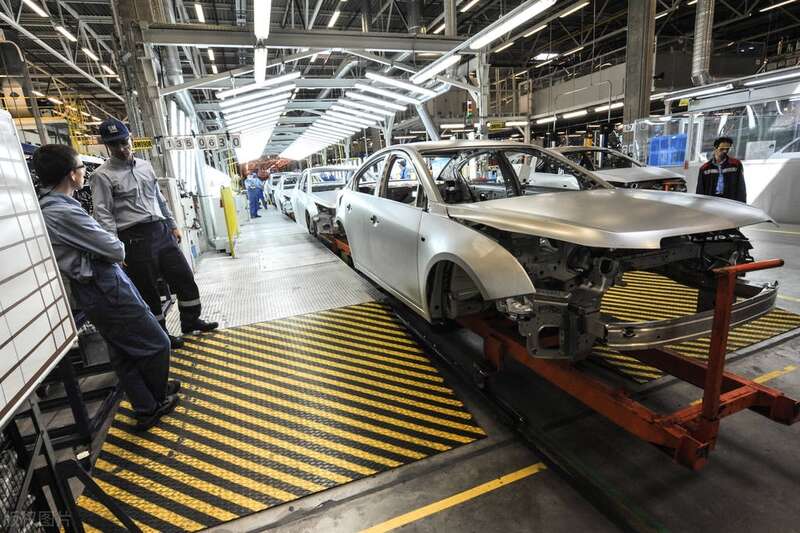
• technology transfer: as many developed countries began to set up companies in China, the Chinese government began to require technology transfer to set up production plants, and many companies accepted it. This is why today China has its own versions of Google, youtube and WhatsApp. This is "it is better to teach fish than to teach fish."
•技术转让:随着许多发达国家开始在中国开设公司,中国政府开始要求进行技术转让,以开设生产工厂,许多公司都接受了。这就是为什么今天中国有了自己版本的谷歌、YouTube和Whatsapp。这就是“授之以鱼不如授之以渔。”
• long term vision: the Chinese government formulates and publishes a vision plan every five years, and they faithfully follow the goals in the plan. Another thing is that in China, people trust the government very much, and no one will question the government's decision as in India. In India, even the government's small-scale land requisition will become national news.
•长期愿景:中国政府每5年制定并发布一次远景规划,他们虔诚地遵循着规划中的目标。还有一件事是,在中国,人们相当信赖政府,没有人会像在印度那样质疑政府的决定,在印度,即使是政府的小规模土地征用也会成为全国新闻。
There are other factors, such as China's century long humiliation, which has created consensus and desire for China's development and competition with the western world. On the other hand, we Indians are forgetting what Britain has done to us.
还有其他因素,比如中国长达一个世纪的屈辱,它为中国发展和与西方世界竞争造就了共识和渴望,而另一方面,我们印度人正在忘记英国对我们做了什么。

